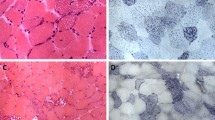Summary
Secondary carnitine deficiency in a patient with glutaric acidaemia type II, due to deficient ETF-dehydrogenase activity, is described. The patient responded clinically to a pharmacological dose of riboflavin and a restricted protein diet. In the second year of her life she developed more frequent and severe exacerbations during intercurrent infections from which she did not fully recover. Hypotonia and marked ataxia persisted. Plasma carnitine was entirely complexed as acylcarnitine with no free carnitine detected. Retrospective evaluation of several frozen urine specimens obtained since the age of 10 months revealed undetectable free carnitine with elevated acylcarnitine levels. Marked clinical improvement was observed followingL-carnitine supplementation. The hypotonia and ataxia disappeared. The frequency and the severity of the exacerbations were noticeably decreased. The role ofL-carnitine in preventing the accumulation of acyl-CoA compounds in inborn errors of organic acid metabolism is further emphasized by this patient. The necessity to evaluate free carnitine, acylcarnitine and acyl/free ratio in the assessment, follow-up and management of patients with inborn errors of organic acid metabolism is discussed.
Similar content being viewed by others
References
Amendt, B. A. and Rhead, W. J. The multiple acyl-coenzyme A dehydrogenation disorders, glutaric aciduria type II and ethylmalonic-adipic aciduria.J. Clin. Invest. 78 (1986) 205–213
Chalmers, R. A., Roe, C. R., Stacey, T. E., Hoppel, C. L. Urinary excretion ofL-carnitine and acylcarnitines by patients with disorders of organic acid metabolism: Evidence for secondary insufficiency ofL-carnitine.Pediatr. Res. 18 (1984) 1325–1328
DiDonato, S., Frerman, F. E., Rimoldi, M., Rinaldo, P., Taroni, F., Wiesmann, U. N., Systemic carnitine deficiency due to lack of electron transfer of flavoprotein: ubiquinone oxidoreductase.Neurology 36 (1986) 957–963
DiDonato, S., Rimoldi, M., Garavaglia, B., Uziel, G. Propionylcarnitine excretion in propionic and methylmalonic acidurias: A cause of carnitine deficiency.Clin. Chim. Acta 139 (1984) 13–21
Duran, M., De Klerk, J. B. C., Wadman, S. K. Bruinvis, L., Ketting, D. The differential diagnosis of dicarboxylic aciduria.J. Inher. Metab. Dis. 7 (Suppl. 1) (1984) 48–51
Frerman, F. E. and Goodman, S. J. Deficiency of electron transfer flavoprotein or electron transfer flavoprotein: Ubiquinone oxidoreductase in glutaric acidaemia type II fibroblasts.Proc. Natl. Acad. Sci. USA 82 (1985) 4517–4520
Goodman, S. I. and Frerman, F. E. Glutaric acidaemia type II (multiple acyl-CoA dehydrogenation deficiency).J. Inher. Metab. Dis. 7 (Suppl. 1) (1984) 33–37
Goodman, S. I. and Markey, S. P. Analytical methods for urine organic acids. In:Diagnosis of Organic Acidemias by Gas Chromatography—Mass Spectrometry, Alan R. Liss, Inc., New York, 1981, pp. 105–14
Goodman, S. I., Stene, D. O., McCabe, E. R. B., Norenberg, M. D., Shikes, R., Stumpf, D. A., Blackburn, G. K. Glutaric acidaemia type II: clinical, biochemical, and morphologic considerations.J. Pediatr. 100 (1982) 946–950
Gregersen, M., Wintzensen, H., Kolvroa, S., Christensen, E., Christensen, M. F., Brandt, N. J., Rasmussen, K. C6-C10-dicarboxylic aciduria: Investigations of a patient with riboflavin responsive multiple acyl-CoA dehydrogenation defects.Pediatr. Res. 16 (1982) 861–868
McGarry, J. D. and Foster, D. W. An improved and simplified radioisotopic assay for the determination of free and esterfied carnitine.J. Lipid. Res. 17 (1976) 277–281
Rebouche, C. J. and Engel, A. G. Carnitine metabolism and deficiency syndromes.Mayo Clin. Proc. 58 (1983) 533–540
Roe, C. R., Millington, D. S., Maltby, D. A., Bohan, T. P., Kahler, S. G., Chalmers, R. A. Diagnostic and therapeutic implications of medium-chain acylcarnitines in the medium-chain acyl-CoA dehydrogenase deficiency.Pediatr. Res. 19 (1985) 459–466
Seccombe, D. W., James, L., Booth, F.L-Carnitine treatment in glutaric aciduria type I.Neurology 36 (1986) 264–267
Stumpf, D. A., Parker, D., Angelini, C. Carnitine deficiency, organic acidemias, and Reye's syndrome.Neurology 35 (1985) 1041–1045
Author information
Authors and Affiliations
Rights and permissions
About this article
Cite this article
Mandel, H., Africk, D., Blitzer, M. et al. The importance of recognizing secondary carnitine deficiency in organic acidaemias: Case report in glutaric acidaemia type II. J Inherit Metab Dis 11, 397–402 (1988). https://doi.org/10.1007/BF01800428
Received:
Accepted:
Issue Date:
DOI: https://doi.org/10.1007/BF01800428




